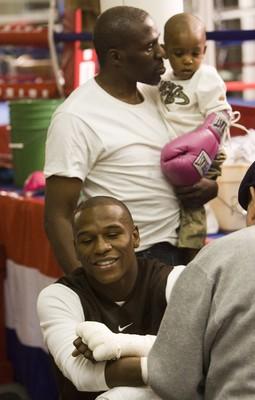As I move on, boxing survives
Every reporter at some point in his or her career has had to write an obituary. It's never a pleasant task.
And so I'm not going to write boxing's obituary as I say goodbye to an extraordinary group of readers.
This is my final boxing column for the Review-Journal -- I start as the boxing/mixed martial arts columnist for Yahoo! Sports on Tuesday -- and I hope I can end the nonsense that the sport is dead.
Boxing does not need me or the federal government or anyone else to save it. Say what you want, but when a single sporting event will gross in excess of $100 million, as next week's blockbuster super welterweight title fight at the MGM Grand Garden between Oscar De La Hoya and Floyd Mayweather Jr. will, it's far from extinction.
Boxing still can use help, though.
It's never solved the problem of the corrupt sanctioning bodies, which have put a stranglehold on the sport. The sanctioning groups' lack of credibility in ranking fighters and managing championship bouts has compromised boxing's reputation.
The federal government has tried -- and failed, miserably so -- to force the sanctioning groups to rank fighters more accurately. Accurate rankings are essential, because they determine the participants in the championship matches.
Roy Jones Jr., who reigned as boxing's pound-for-pound champion for many years, has won one fight in the last 3 1/2 years, against the forgettable Badi Ajamu. He's lost three of his last four and been knocked out in two of them, but the WBO ranks Jones No. 1, the WBA No. 2, the WBC No. 7 and the IBF No. 9.
It's sheer lunacy. He was great. He now stinks. If he wants to continue to fight, that's his choice. But until he beats a few quality opponents, he doesn't deserve to be anywhere near any top 10.
Bad matches consistently turn fans off. Last month, Wladimir Klitschko retained his IBF belt by stopping Ray Austin, a guy who had as much business in a heavyweight title fight as Verne Troyer. Yet the IBF sanctioned it, and HBO somehow agreed to televise it.
HBO and Showtime, which fund the bouts, need to use their financial muscle to stamp out those types of mismatches.
If HBO hadn't agreed to televise it, it probably would not have been made.
The sanctioning bodies make money from the percentage of the purses they charge fighters to compete for their belts. Fighters make more when their bouts are televised on HBO or Showtime. So if HBO and Showtime refused to accept that kind of dreck, the fighters' pay would be reduced and the sanctioning bodies' take would be cut.
That quickly would lead to better ratings and, thus, more appealing matches.
The fighters have a role in the health of the sport, too, and they ought to be more open in an attempt to help it grow. Mayweather opened his camp to any reporter who wanted to see him. Too many fighters, though, train in seclusion and avoid the media, which is why so many superb fighters are largely unknown.
Fighters also are notoriously disloyal and will abandon the persons who invested years and many dollars into building their careers. But the athletes, as they long have been, frequently are exploited. A cap needs to be placed on the percentage a manager can take from a boxer's pay.
A manager or a promoter -- or both -- making more from a bout than the fighter is appalling, but it is one of the sport's ugly truths. That needs to change.
Bottom line, though, is the overwhelming interest in the De La Hoya-Mayweather fight proves the public loves a good fight. But boxing too often gives the public a reason not to watch.
I began at the Review-Journal in July 1990, and my first fight came a few months later, when I covered the Buster Douglas-Evander Holyfield heavyweight title bout at the Mirage.
Back then, as now, talk of the sport's demise was rampant. I suspect that was true in any age.
Boxing survived the naysayers then, and it will survive them now, because nothing in sports compares to the passion and the emotion that a great fight generates.
Being the boxing writer in the boxing capital of the world has been an honor. I'd be remiss if I didn't publicly thank my predecessor, Royce Feour, and the excellent copy editors at the Review-Journal, who so consistently have done great work.
And mostly, thank you, the readers of this column. You know better than anyone that this sport is far from dead.
KEVIN IOLEMORE COLUMNS






















